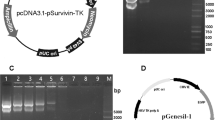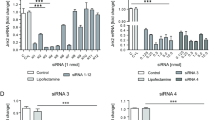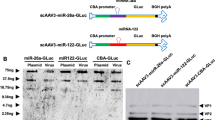Abstract
Suicide gene therapy using ganciclovir (GCV) with transfection of the herpes thymidine kinase (HSVtk) gene has been studied for cancer therapy. The present study demonstrates an efficient method of suicide gene therapy for multiple hepatic tumors, involving repetitive transfection of the HSVtk gene driven by the alpha-fetoprotein (AFP) promoter using hemagglutinating virus of Japan (HVJ)-liposomes. AFP-producing cells (HUH7) and AFP-nonproducing cells (LS180) were injected subcutaneously (s.c.) to establish tumors in nude mice. Two plasmid constructs, bacterial LacZ gene driven by the AFP promoter (AFPLacZ), and HSVtk gene driven by the AFP promoter (AFPTK1) were encapsulated into the HVJ-liposome and used. When AFPLacZ was injected into the s.c. tumors, expression of LacZ gene was confined to HUH7 tumors. Repeated transfection of AFPTK1 followed by GCV treatment markedly suppressed growth of HUH7 tumors, and apoptosis of HUH7 cells was recognized in the tumor. Next, HUH7 cells were injected into the portal vein in severe combined immunodeficiency mice to establish a hepatic tumor model. After inoculation with the tumor, HVJ-liposomes containing the AFPTK1 plasmid vector were injected into the portal vein via the splenic hilum, followed by GCV treatment. This gene therapy significantly inhibited the growth of tumors in the liver and markedly improved survival. Three injections of the AFPTK1 plasmid vector completely inhibited tumor growth. This procedure seems to have great potential for the treatment of multiple hepatic tumors.
This is a preview of subscription content, access via your institution
Access options
Subscribe to this journal
Receive 12 print issues and online access
$259.00 per year
only $21.58 per issue
Buy this article
- Purchase on Springer Link
- Instant access to full article PDF
Prices may be subject to local taxes which are calculated during checkout





Similar content being viewed by others
References
Colombo M . Hepatocellular carcinoma J Hepatol 1992 15: 225–236
El-Serag HB, Mason AC . Rising incidence of hepatocellular carcinoma in the United States New Engl J Med 1999 340: 745–750
Levin B, Amos C . Therapy of unresectable hepatocellular carcinoma New Engl J Med 1995 332: 1294–1296
Kaneko S et al. Adenovirus-mediated gene therapy of hepatocellular carcinoma using cancer specific gene expression Cancer Res 1995 55: 5283–5287
Ido A et al. Gene therapy for hepatoma cells using a retrovirus vector carrying herpes simplex virus thymidine kinase gene under the control of human α-protein gene promoter Cancer Res 1995 55: 3105–3109
Hirano T et al. Persistent gene expression in rat liver in vivo by repetitive transfections using HVJ-liposome Gene Therapy 1998 5: 459–464
Ferry N et al. Retroviral-mediated gene transfer into hepatocytes in vivo Proc Natl Acad Sci USA 1991 88: 8377–8381
Kaleko M, Garcia JV, Miller AD . Persistent gene expression after retroviral gene tansfer into liver cells in vivo Hum Gene Ther 1991 2: 27–32
Li Q et al. Assessment of recombinant adenoviral vectors for hepatic gene therapy Hum Gene Ther 1993 4: 403–409
Kaneda Y, Iwaki K, Uchida T . Increased expression of DNA cointroduced with nuclear protein in adult rat liver Science 1989 243: 375–378
Ueki T et al. Hepatocyte growth factor gene therapy of liver cirrhosis in rats Nature Med 1999 5: 226–230
Kozlowski JM et al. Metastatic behavior of human tumor cell lines grown in the nude mouse Cancer Res 1984 44: 3522–3529
Takahashi H, Nakada T, Puisieux I . Inhibition of colon cancer growth by antibody-directed human LAK cells in SCID mice Science 1993 259: 1460–1463
Acknowledgements
This work was supported by a Grant-in Aid for Scientific Research provided by the Ministry of Education, Science and Culture of Japan (No. 07457282).
Author information
Authors and Affiliations
Rights and permissions
About this article
Cite this article
Hirano, T., Kaneko, S., Kaneda, Y. et al. HVJ-liposome-mediated transfection of HSVtk gene driven by AFP promoter inhibits hepatic tumor growth of hepatocellular carcinoma in SCID mice. Gene Ther 8, 80–83 (2001). https://doi.org/10.1038/sj.gt.3301355
Received:
Accepted:
Published:
Issue Date:
DOI: https://doi.org/10.1038/sj.gt.3301355
Keywords
This article is cited by
-
Tumor-specific Expression of MicroRNA-26a Suppresses Human Hepatocellular Carcinoma Growth via Cyclin-dependent and -independent Pathways
Molecular Therapy (2011)
-
Expression of thymidine kinase driven by an endothelial-specific promoter inhibits tumor growth of Lewis lung carcinoma cells in transgenic mice
Gene Therapy (2003)
-
Gene therapy of hepatocarcinoma: a long way from the concept to the therapeutical impact
Cancer Gene Therapy (2003)



